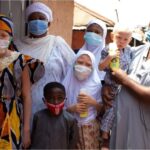Writing held great allure for young Oluwatobiloba Akerele, who meticulously recorded her childhood experiences “even when I did anything wrong,” she told Prime Progress. This natural aptitude for communication could be traced to her career-oriented parents, both of whom worked in the field of advertising. An academic background in mass communication further shaped this childhood inclination, laying the groundwork for an exceptional career in strategic communication.
Akerele’s foray into the health and development sector was inspired by the setbacks the public suffered due to a lack of strategic communication. She began her journey as a volunteer in health communication, a role that set her on a path to eventually lead communication roles at global corporate bodies.
In 2017, she served a pivotal role as the Head of Corporate Communications at a multinational firm, where she led its sales and marketing team in four west-African countries, including Nigeria and Togo. Akerele recalled this as a highlight in her career, as the role allowed her to enhance performance within organisational performance and spearheaded initiatives in digital transformation.
One remarkable achievement was her work in developing advocacy briefs that successfully convinced government stakeholders to fund malaria interventions through strategic communication in public health initiatives.
“People do not want to give out money for every reason. We can drive that change to make the government put the people at the centre of their finances, it is a very rewarding experience for me,” she expressed.
The impact of this initiative is felt across 11 states, including Akwa-Ibom, Ebonyi, Cross-River, Oyo, Nassarawa, Benue, Plateau, Zamfara, Sokoto, Kebbi, and Bauchi.
Currently, Akerele leads strategic communications for the U.S. President’s Malaria Initiative for States (PMI-S) project, managed by Management Sciences for Health (MSH). This vital project collaborates with diverse partners and governmental agencies at both national and state levels to improve the quality and accessibility of malaria prevention and treatment services in Nigeria. Under her guidance, the initiative has made significant strides in its mission, driven by her innovative and effective communication strategies.
Beyond her immediate professional responsibilities, Akerele is creating visibility for the PMI-S project by being actively involved in research, documentation, and knowledge transfer, ensuring that success stories and key insights from her projects are shared widely. These efforts have led to significant visibility for the PMI-S project, including features in the U.S. Malaria Initiative annual report and advocacy wins at the state level in Nigeria.
To further sustainable growth in the health and development sector, she developed the Engage the Community, Adopt Technology, Service Provision, Economic Empowerment (EASE) model for Community-Based Social Health Insurance Programs. This model is a strategic approach to community engagement and technological adoption.
Additionally, she introduced the Research, Engage, Adopt Technology, Campaign, and Harmonize (REACH) model, which forms the foundation of her winning communication strategies.
In such an impactful career, challenges are inevitable. Akerele has navigated her fair share, particularly in changing social and behavioural attitudes towards malaria prevention. She pointed out the need to encourage pregnant women to embrace malaria prevention vaccines for the safety of their unborn children.
Her comprehensive approach to malaria intervention encompasses diagnosis and treatment, data accuracy and reliability, health system strengthening, and preventive medication for pregnant women. Through persistent advocacy and community engagement, she and her team have driven notable changes, such as the Oyo state government’s pledge for seasonal malaria prevention for children under five.
Aside from her professional achievements, Akerele is dedicated to empowering women and youth. She is an active member of interagency gender working groups and conducts etiquette training sessions in schools, emphasising the importance of self-worth and confident communication. For Akerele, developing powerful decision-making skills, conflict resolution skills, and self-worth can redefine the world for women.
Reflecting on her career, Akerele credits God and her upbringing, stating that her religious values have significantly shaped her choices in life.
Married to a medical doctor with a son, Akerele is now a strategic communication leader with over a decade of progressive experience, providing public relations and integrated marketing communications solutions for organisations across sectors. Her work, particularly in global health projects, underscores her commitment to leveraging communication for societal good.
Oluwatobiloba Akerele's passion for writing began in her childhood, influenced by her parents' careers in advertising. This early interest, combined with an academic background in mass communication, laid the groundwork for her outstanding career in strategic communication.
Starting as a volunteer in health communication, Akerele's journey led her to significant roles, including Head of Corporate Communications at a multinational firm in 2017, where she led initiatives across four West African countries. A highlight of her career was developing advocacy briefs that convinced government stakeholders to fund malaria interventions, impacting 11 states in Nigeria.
Currently, Akerele leads strategic communications for the U.S. President’s Malaria Initiative for States (PMI-S) project, managed by Management Sciences for Health (MSH). She collaborates with partners and government agencies to enhance malaria prevention and treatment in Nigeria, achieving considerable success through innovative communication strategies.
Akerele's dedication extends beyond her primary responsibilities. She ensures the PMI-S project's visibility through active involvement in research, documentation, and knowledge sharing. Her efforts have led to significant recognition, including features in the U.S. Malaria Initiative annual report.
She developed the EASE model for Community-Based Social Health Insurance Programs and the REACH model, foundational to her communication strategies. Akerele has also tackled challenges such as changing societal attitudes towards malaria prevention, emphasizing the importance of preventive measures for pregnant women.
Her comprehensive approach includes diagnostic and treatment measures, data accuracy, health system strengthening, and advocacy efforts, leading to state-level commitments like Oyo state's seasonal malaria prevention for children under five.
Beyond her strategic roles, Akerele is committed to empowering women and youth, participating in gender working groups and providing etiquette training. She attributes her career success to her religious values and upbringing, highlighting their influence on her life choices.
Married to a medical doctor with a son, Akerele now boasts over a decade of experience in public relations and integrated marketing communications, particularly in global health projects, showcasing her commitment to societal betterment through strategic communication.






